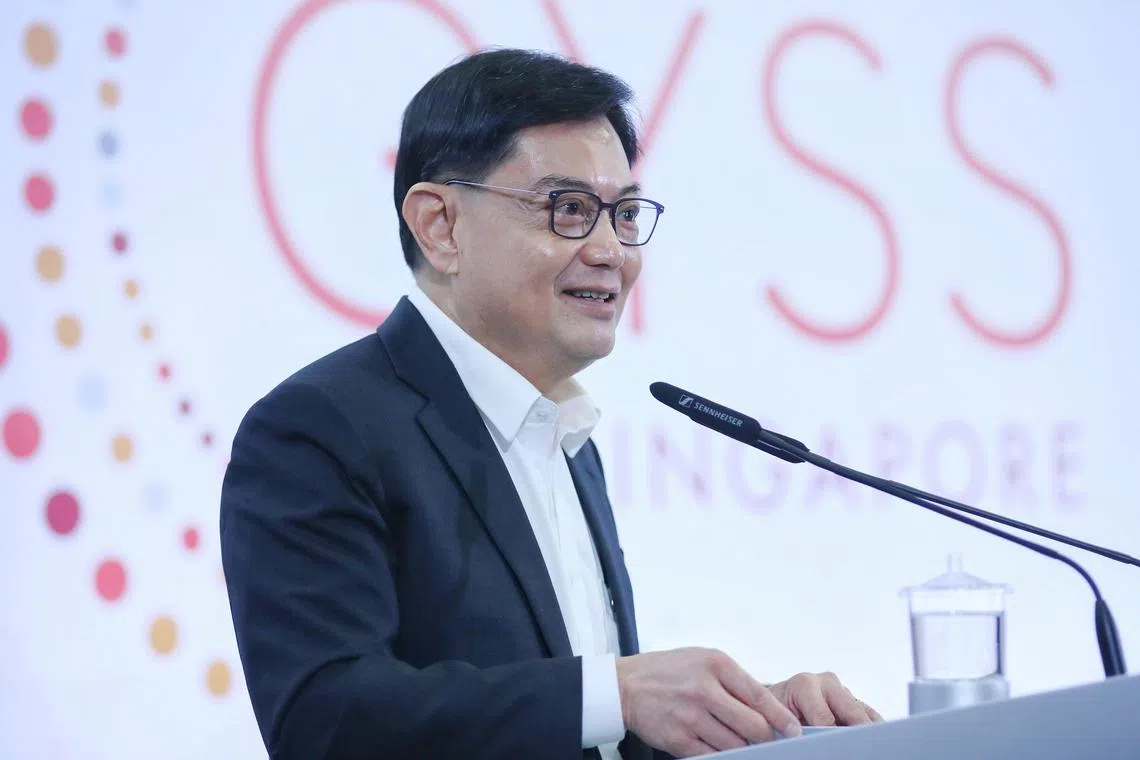Global scientific community must work together in spite of geopolitical tensions: DPM Heng
Sign up now: Get ST's newsletters delivered to your inbox

DPM Heng Swee Keat speaking during the opening ceremony of the Global Young Scientists Summit held at SUTD on Jan 17.
ST PHOTO: FELINE LIM
Follow topic:
SINGAPORE – The scientific community can collaborate on the advancement of knowledge, regardless of the ups and downs of international relations, said Deputy Prime Minister Heng Swee Keat on Tuesday.
Speaking at the 2023 Global Young Scientists Summit, Mr Heng, who is chairman of the National Research Foundation (NRF), said collaboration has slowed or stalled in some areas as a result of intensified competition between major powers and fractured political rhetoric.
In such an environment, science can provide objectivity and rigour, he noted.
It can bring together the best minds to “study and develop solutions for challenges that affect the world, regardless of nationality and political beliefs”, he added.
He gave the example of the 2022 Nobel Prize in Physics, which was won by physicists Alain Aspect, John Clauser and Anton Zeilinger for developing experimental tools that helped prove quantum entanglement – a phenomenon where states of particles depend on one another regardless of distance, described by scientist Albert Einstein as “spooky action at a distance”.
“The three laureates I highlighted are of different nationalities – Aspect is French, Clauser is American and Zeilinger is Austrian,” said Mr Heng, who is also Coordinating Minister for Economic Policies. “This is the true beauty of science – its ability to bring together people from different cultures, nationalities and religions, in pursuit of the common mission of growing scientific knowledge.”
Now in its 11th year, the Global Young Scientists Summit will run until Friday at the Singapore University of Technology and Design in Changi. There will be lectures and panel discussions with 21 eminent scientists, including Nobel laureates and winners of the Millennium Technology Prize, awarded by independent foundation Technology Academy Finland.
After the event, which is organised by the NRF, was held virtually in the past two years due to the Covid-19 pandemic, this year’s edition is adopting a hybrid format, with attendees from 29 countries.
About 350 participants are attending in person, while more than 1,400 are engaged virtually.
Among the topics being discussed are advances in graphene research, current trends in high-performance computing, and the impact of brain processes on health and diseases.
The pandemic has been a reminder of the role played by the scientific community in tackling global challenges, Mr Heng said.
“Without the prompt and significant developments in diagnostics, vaccines and therapeutics, we might still be holding this summit virtually,” he added.
While the world has not yet overcome the coronavirus, it must now tackle other challenges such as climate change and ageing populations, Mr Heng said.
Breakthroughs such as making existing low-carbon technology more economically viable and exploring new possibilities like nuclear fusion will be needed to get the world to net-zero emissions, he noted.
“Science will be the driving force for tackling global challenges. In this sense, the global scientific community carries hope for humanity.”

